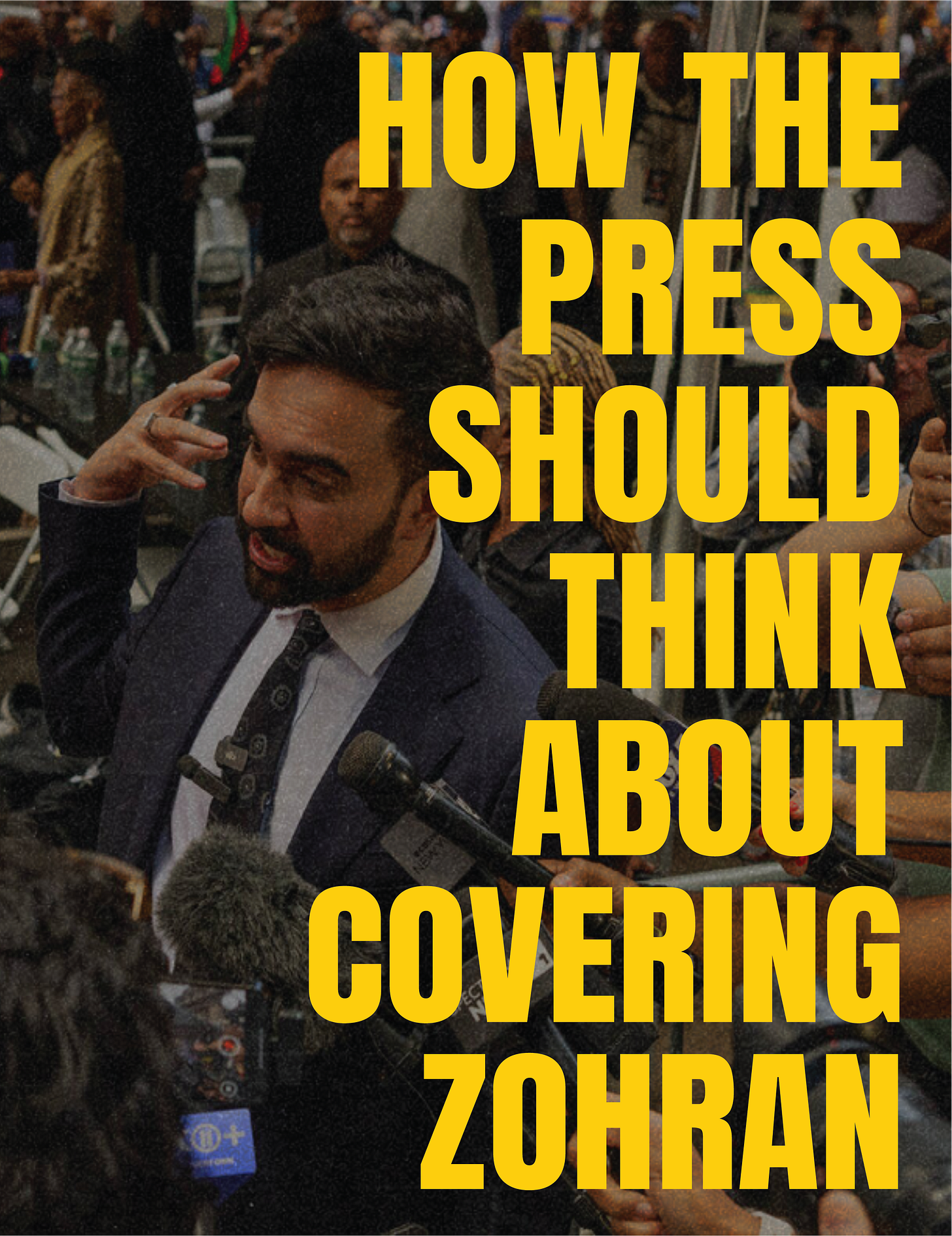What Reporters Covering Zohran Should Keep in Mind
From what I learned in my time on the government side of the comms divide, here’s what’s worth keeping in mind for reporters covering Mamdani:
(1). Zohran is a human being. He is not the second coming. He is not the devil. He will never be as pure as his supporters want him to be and he’s not as crazy or evil or dumb as his opponents claim he is.
The more you cover him as a full fledged human rather than as a half fictional figure (good or bad), the more interesting the coverage anyway. Easy reporting is just using the caricature and then getting affirmation and attention online for it from the usual suspects. Good reporting is portraying people as the complex characters are — both good and bad. If progressive reporters think they have to affirm him at all times, that will make their coverage extremely tedious, extremely quickly. And if other reporters believe their job is to undermine him all the time, same outcome. Just do the actual job that made you choose journalism in the first place.
(2). You have to choose between being reporters and being quasi-public figures. Until recently, most reporters were still mainly in the background. That changed with social media and it seems to me we have two types of reporters now — those who just want to cover the news as fairly as they can and let the story speak for itself and those who want to use their reporting to get on tv, get on podcasts, get more followers, find new ways for them to make money and grow their brand. The latter is a one person business pretending to be a journalist.1 The former is actual reporting. If you want to truly cover Mamdani fairly, success and failure alike, you can’t do both.
(3). The landscape has changed a lot. If you’re mapping out the alliances, feuds, uneasy truces, tensions and everything else in New York government and politics and culture, you need to do it based on how the world works today. Unions aren’t inherently all anti-business. Business groups aren’t inherently anti-labor. People of color aren’t automatically liberal or even Democrats. Almost none of the usual tropes still apply. Current City Hall reporters already know this, but anyone moving into the beat might still have some of the old assumptions in mind. Shed them.
(4). Transparency and responsiveness works both ways. You want open access to deputy mayors and commissioners. You want City Hall staffers to feel comfortable talking to you. That means making it possible for them to do so. Don’t burn them when you know something is off the record (if it’s a close call, remember that once you choose to publish it, your relationship with that person is likely over forever). Praise the mayor for having a transparent and accessible administration if that’s how it turns out (people like positive reinforcement). Give the press office sufficient time to comment.
Remember that the people working in City Hall and at the agencies are working very hard to create programs and policies that they truly believe will help New Yorkers. Don’t show up at the press conference, ignore their hard work entirely and instead just always choose the easy path instead, focusing on current controversies, scandal, shit-talking, other elections — virtually nothing that will ever impact or matter to real people. Treat the administration seriously and they will likely do the same in return (and if they don’t, then have at it).
Every mayor will feel frustrated that their accomplishments are not being sufficiently recognized and covered. Every reporter will feel like the administration is not fully open with them and is hiding something. It’s never going to be free and easy. But it can be fair and productive on both sides.
If you want to publicly express your opinions, there are endless ways to do it. I’m doing it right now, just like I do in podcasts, on tv, in speeches, in my Daily News column, in my books, etc… But I am in no way, shape or form a real journalist. The problem, to me, is when someone is fully a pundit or just someone like me who has a day job but also talks too much but pretends to be a journalist.



Stellar - “Unions aren’t inherently all anti-business. Business groups aren’t inherently anti-labor. People of color aren’t automatically liberal or even Democrats. Almost none of the usual tropes still apply.”